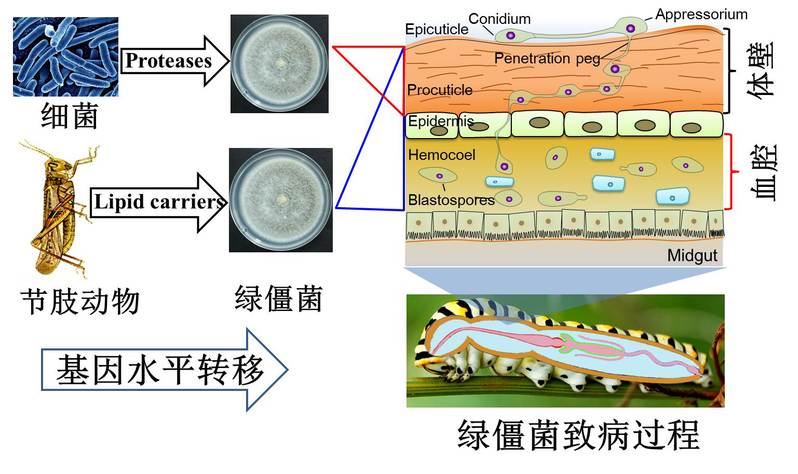Title: Horizontal gene transfer allowed the emergence of broad host range entomopathogens
Qiangqiang Zhang, Xiaoxuan Chen, Chuan Xu, Hong Zhao, Xing Zhang, Guohong Zeng, Ying Qian, Ran Liu, Na Guo, Wubin Mi, Yamin Meng, Raymond J. St. Leger, and Weiguo Fang
PNAS April 16, 2019 116 (16) 7982-7989; first published April 4, 2019 https://doi.org/10.1073/pnas.1816430116
Abstract
The emergence of new pathogenic fungi has profoundly impacted global biota, but the underlying mechanisms behind host shifts remain largely unknown. The endophytic insect pathogen Metarhizium robertsii evolved from fungi that were plant associates, and entomopathogenicity is a more recently acquired adaptation. Here we report that the broad host-range entomopathogen M. robertsii has 18 genes that are derived via horizontal gene transfer (HGT). The necessity of degrading insect cuticle served as a major selective pressure to retain these genes, as 12 are up-regulated during penetration; 6 were confirmed to have a role in penetration, and their collective actions are indispensable for infection. Two lipid-carrier genes are involved in utilizing epicuticular lipids, and a third (MrNPC2a) facilitates hemocoel colonization. Three proteases degraded the procuticular protein matrix, which facilitated up-regulation of other cuticle-degrading enzymes. The three lipid carriers and one of the proteases are present in all analyzed Metarhizium species and are essential for entomopathogenicity. Acquisition of another protease (MAA_01413) in an ancestor of broad host-range lineages contributed to their host-range expansion, as heterologous expression in the locust specialist Metarhizium acridum enabled it to kill caterpillars. Our work reveals that HGT was a key mechanism in the emergence of entomopathogenicity in Metarhizium from a plant-associated ancestor and in subsequent host-range expansion by some Metarhizium lineages.
Link: https://www.pnas.org/content/116/16/7982.long






